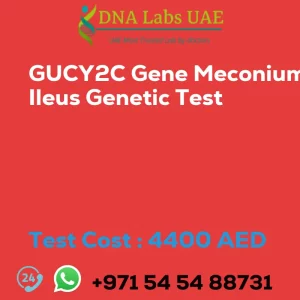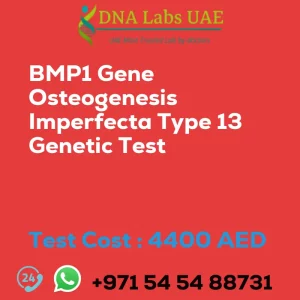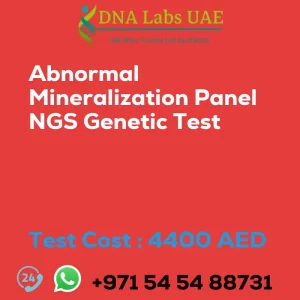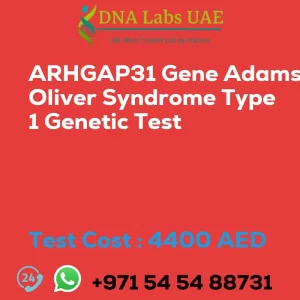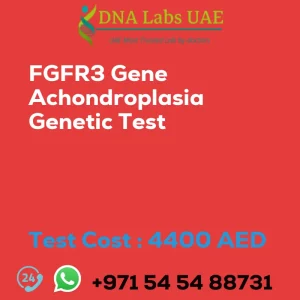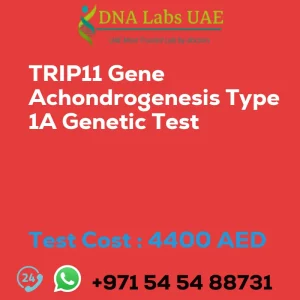G6PC3 Gene Neutropenia severe congenital type 4 autosomal recessive Genetic Test
At DNA Labs UAE, we offer the G6PC3 Gene Neutropenia severe congenital type 4 autosomal recessive Genetic Test for AED 4400.0.
Test Details
The G6PC3 gene is associated with a condition called severe congenital neutropenia type 4, which is an autosomal recessive disorder. This condition affects the production of neutrophils, a type of white blood cell that plays a crucial role in the immune system’s ability to fight off infections.
NGS (Next-Generation Sequencing) genetic testing refers to a type of genetic testing that can simultaneously analyze multiple genes or even the entire genome. In the case of G6PC3 gene testing, NGS can be used to identify any mutations or variants in the G6PC3 gene that may be causing severe congenital neutropenia type 4.
Genetic testing for G6PC3 gene mutations can help diagnose individuals with severe congenital neutropenia type 4, especially if they present with symptoms such as recurrent infections, delayed growth, or abnormal bone development. It can also be used for carrier testing in families with a history of the condition.
Overall, NGS genetic testing for the G6PC3 gene can provide valuable information for diagnosing and managing individuals with severe congenital neutropenia type 4, as well as for genetic counseling and family planning purposes.
Test Components and Price
- Test Name: G6PC3 Gene Neutropenia severe congenital type 4 autosomal recessive Genetic Test
- Price: 4400.0 AED
Sample Condition
We accept blood or extracted DNA samples for this test. Alternatively, you can provide one drop of blood on an FTA Card.
Report Delivery
Your test report will be delivered within 3 to 4 weeks.
Method
We use NGS Technology for this genetic test.
Test Type
This test is categorized under Osteology, Dermatology, and Immunology Disorders.
Doctor and Test Department
- Doctor: Dermatologist
- Test Department: Genetics
Pre Test Information
Prior to the G6PC3 Gene Neutropenia severe congenital type 4 autosomal recessive Genetic Test, it is important to provide the clinical history of the patient. Additionally, a Genetic Counselling session will be conducted to draw a pedigree chart of family members affected with G6PC3 Gene Neutropenia, severe congenital type 4, autosomal recessive NGS Genetic DNA Test gene G6PC3.
| Test Name | G6PC3 Gene Neutropenia severe congenital type 4 autosomal recessive Genetic Test |
|---|---|
| Components | |
| Price | 4400.0 AED |
| Sample Condition | Blood or Extracted DNA or One drop Blood on FTA Card |
| Report Delivery | 3 to 4 Weeks |
| Method | NGS Technology |
| Test type | Osteology Dermatology Immunology Disorders |
| Doctor | Dermatologist |
| Test Department: | Genetics |
| Pre Test Information | Clinical History of Patient who is going for G6PC3 Gene Neutropenia, severe congenital type 4, autosomal recessive NGS Genetic DNA Test. A Genetic Counselling session to draw a pedigree chart of family members affected with G6PC3 Gene Neutropenia, severe congenital type 4, autosomal recessive NGS Genetic DNA Test gene G6PC3 |
| Test Details |
The G6PC3 gene is associated with a condition called severe congenital neutropenia type 4, which is an autosomal recessive disorder. This condition affects the production of neutrophils, a type of white blood cell that plays a crucial role in the immune system’s ability to fight off infections. NGS (Next-Generation Sequencing) genetic testing refers to a type of genetic testing that can simultaneously analyze multiple genes or even the entire genome. In the case of G6PC3 gene testing, NGS can be used to identify any mutations or variants in the G6PC3 gene that may be causing severe congenital neutropenia type 4. Genetic testing for G6PC3 gene mutations can help diagnose individuals with severe congenital neutropenia type 4, especially if they present with symptoms such as recurrent infections, delayed growth, or abnormal bone development. It can also be used for carrier testing in families with a history of the condition. Overall, NGS genetic testing for the G6PC3 gene can provide valuable information for diagnosing and managing individuals with severe congenital neutropenia type 4, as well as for genetic counseling and family planning purposes. |


